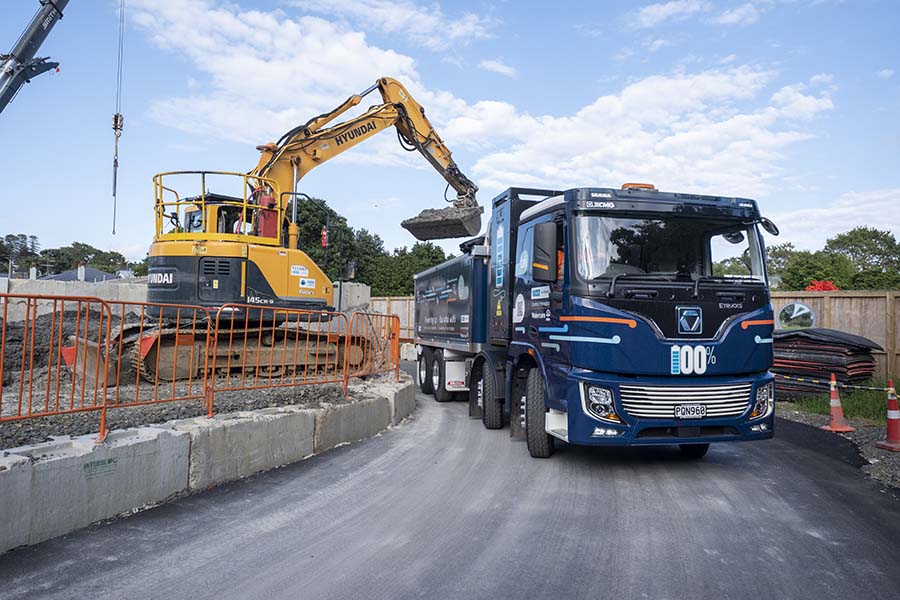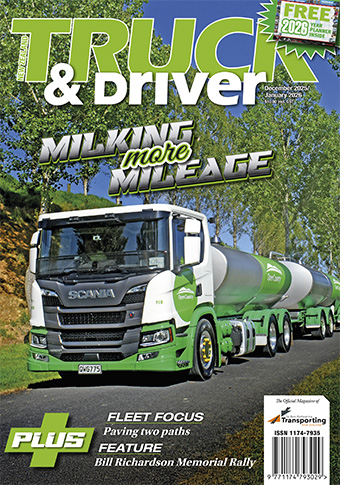Aeolus Truck & Driver News


EV trucks for Watercare
Aeolus Truck & Driver News
Three new XCMG E700 battery swap electric tipper trucks in Watercare branding are at work on the $1.2b Central Interceptor project near Māngere.
The 8x4 electric tippers can each transport up to 13 tonnes of material, with an average range of 200km and are powered by a single battery pack. Charging takes 90 minutes, or the 2,800kg battery packs can be swapped for a fully charged replacement using a dedicated gantry in around 10 minutes.
The 14.7km Central Interceptor wastewater tunnel due for completion in 2026 will improve the health of central Auckland waterways by significantly reducing wastewater overflows due to heavy rain. Since January 2023, the e-trucks have been transporting excavated material from tunnel and shaft sites to Puketutu Island, where Watercare is carrying out a rehabilitation project at a former quarry.
Central Interceptor executive programme director Shayne Cunis says the e-trucks are an exciting addition to the project’s overall sustainability strategy.
...Three new XCMG E700 battery swap electric tipper trucks in Watercare branding are at work on the $1.2b Central Interceptor project near Māngere.
The 8x4 electric tippers can each transport up to 13 tonnes of material, with an average range of 200km and are powered by a single battery pack. Charging takes 90 minutes, or the 2,800kg battery packs can be swapped for a fully charged replacement using a dedicated gantry in around 10 minutes.
The 14.7km Central Interceptor wastewater tunnel due for completion in 2026 will improve the health of central Auckland waterways by significantly reducing wastewater overflows due to heavy rain. Since January 2023, the e-trucks have been transporting excavated material from tunnel and shaft sites to Puketutu Island, where Watercare is carrying out a rehabilitation project at a former quarry.
Central Interceptor executive programme director Shayne Cunis says the e-trucks are an exciting addition to the project’s overall sustainability strategy.
“This is a stand-out project in terms of safety, expertise and benefiting the environment,” he says.
“The e-trucks will not only provide huge carbon savings through zero emissions, but residents living alongside some of our 16 construction sites will benefit hugely from having almost silent truck movements. Being a good neighbour is very important to us.”
The e-trucks were manufactured by XCMG, a leading global electric truck and construction equipment manufacturer in China. Following extensive testing in Auckland, the trucks were sent to Rotorua where local truck trailer manufacturer Mills-Tui designed and installed the tipper bodies.
The Central Interceptor project is being delivered by Ghella Abergeldie JV (GAJV) and received $500,000 in co-funding for the e-trucks from the Energy Efficiency and Conservation Authority (EECA) under the Government’s new-look Low Emission Transport Fund (LETF).
GAJV Social Responsibility Manager, Sandra Edward has helped to drive the project from its inception.
“Getting the trucks here has been a long process. The global pandemic certainly got in the way, but we’re thrilled they’re finally here and, on the road,” she says.
“We’re very excited by some of the specific design features such as reversing cameras and bin cameras, as well as an automatic tarp cover that slides over the top of the material for the journey to the tip site.”
Over the next four years, the trucks are projected to transport 66,000 tonnes of spoil and reduce at least 306 tonnes of CO2-e (the equivalent of driving from Cape Reinga to Bluff more than 800 times). For every 100,000km travelled, around 50,000 litres of diesel will be saved.
The eye-catching branding was designed in consultation with Watercare’s Mana Whenua Kaitiaki Managers Forum and includes graphics of ancient shells and a stingray, after a tooth and other three- to four-million-year-old artefacts were discovered during early site excavation.
Each truck has a QR code, which leads to Watercare’s website and more information about the Central Interceptor project and the e-trucks themselves.
The Central Interceptor team hopes to share the learnings of the e-tipper experience throughout the construction industry.



 + EQUIPMENT GUIDE - FREE
+ EQUIPMENT GUIDE - FREE
